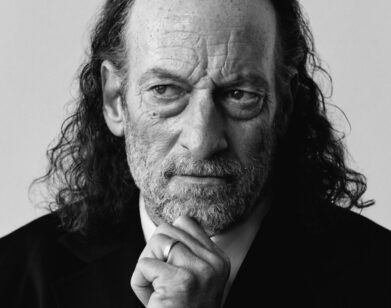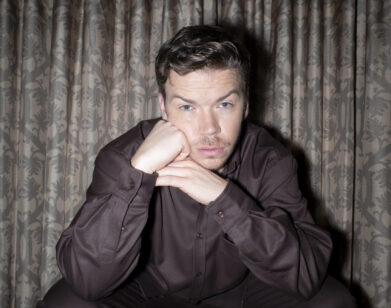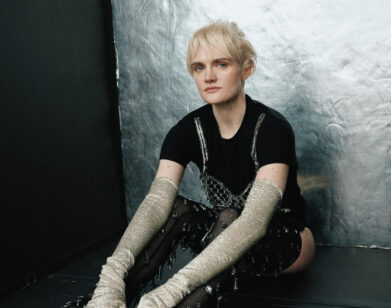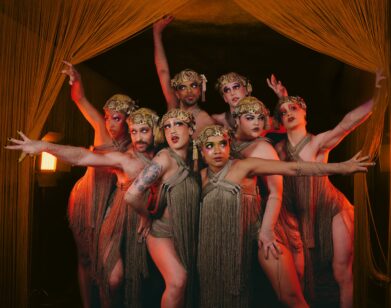BACKSTAGE
Tommy Dorfman Is Doing Double Duty in Broadway’s Romeo & Juliet Reboot
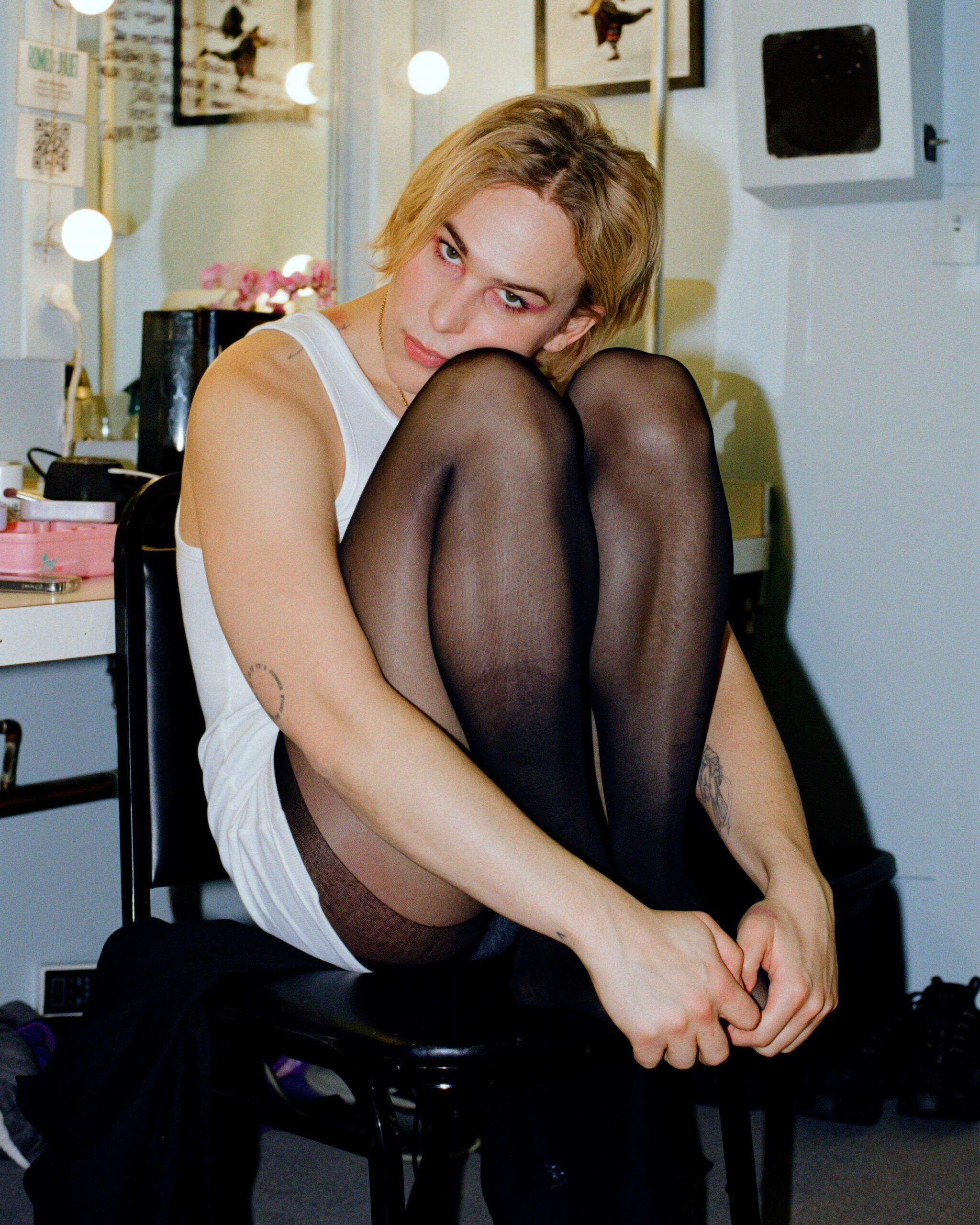
Tommy Dorfman, photographed by Dev Bowman.
How does Tommy Dorfman wake up six days a week ready to tackle a dual role as both Tybalt and the Nurse (opposite Rachel Zegler and Kit Connor) in the new Broadway production of Romeo & Juliet? The answer is: one cigarette, one cold brew, one dirty chai, some hot yoga, a 10-minute app-based meditation, and one dog walk (this time, sans phone). “Some days I feel really open to making eye contact with the audience,” the actor explained of her double act. “But there are days where I’m terrified, and I need to just lay down on the blow-up inflatable plastic couch and stare into the lights until I go blind.” Directed by the Tony-winning veteran Sam Gold, the show will run for 20 weeks this winter, boldly subverting one of most epic and well-known tragedies of the stage with some zany language flips, a thumping soundtrack courtesy of Jack Antonoff, and a star-studded cast of young Hollywood’s elite. To discuss her Broadway debut, Dorfman called up fellow actor and Cabaret star Gayle Rankin the day after the election to talk vices, vapes, and pre-show rituals.—EMILY SANDSTROM
———
RANKIN: Wait, where are you?
DORFMAN: I’m home in Chinatown with—
RANKIN: Who is that?
DORFMAN: Fiona Shaw. Five years old. I got her during the pandemic. She’s perfect—butch, dyke dog energy.
RANKIN: I love it.
DORFMAN: Are you upstate?
RANKIN: Yeah, I’m in Woodstock. You have a show tonight, right?
DORFMAN: I have a show tonight.
RANKIN: How are you doing? I think that’s the main question I had. I don’t really know how we talk about much else other than how the fuck this–
DORFMAN: I mean, it’s been a really fucking crazy week. I’m not actually all that surprised, if I’m being honest. I sort of felt this Trump situation coming. It seemed more likely than not, and Wednesday was a really tough day.
RANKIN: Did you watch any of it?
DORFMAN: I went to dinner, and then I went over to my friend Brandon’s house and he had some people over. There were a lot of gay people watching the news, and I was oscillating between a pint of Ben and Jerry’s, chain-smoking out a window, and watching whatever fucking CNN was on the projector. I went to bed and I woke up at 9:00 and I didn’t look at my phone for 20 minutes. I just laid in bed because I didn’t want to know what I knew to be true. Then I got to the theater, and you know Sam [Gold]…
RANKIN: I know Sam.
DORFMAN: My director. We had a check-in, if you will, before our Wednesday matinee, which as you know is already kind of cursed when you’re on Broadway.
RANKIN: Yeah.
DORFMAN: And it was sort of a space in which we could grieve collectively in some capacity, or mourn, or share things, but nobody really talked. I certainly was not in the mood to talk. I wasn’t really in the mood to socialize at all, and I didn’t feel ready to do the show, necessarily. But doing Romeo and Juliet, there’s so much violence accessible to us and so much grief in the text. Not to be the girl who’s like, “Use it,” but I didn’t know what else to do.
RANKIN: Be that girl.
DORFMAN: So I used it, and it was a really cathartic two-show day. At the end of the day, I have all my faculties. My life is really safe and beautiful right now, so there remains a lot to be grateful for and a lot to fight for. But I do have these moments with Juliet where I say, “There’s no trust in men,” just talking about how men are fucking liars and thieves and dissemblers.
RANKIN: Shakespeare knew, in some ways, how to write women.
DORFMAN: Yeah, there’s no faith, no trust, no honesty in men. All perjured, all forsworn, all dissemblers. I was just like, “Literally facts.”
RANKIN: Right, that language comes easy.
DORFMAN: Nothing has changed.
RANKIN: Yeah. I just want to talk about your performance for a second. It’s such a sophisticated, unflinching, hilarious, dangerous kind of relay race between these characters. I wanted to talk to you about art-making as a part of your work, your work as a citizen, and also this double casting stuff, because Sam does it a lot. I fucking did it. Do you find it helpful?
DORFMAN: Well, first of all, thank you. I’m very grateful for your words and I feel so similarly about your work. It is really revelatory and visceral in a way that I find quite inspiring. I remember feeling very connected to you when I saw you in Cabaret. I was like, “I really get what’s happening here.” It’s like an invitation to explore things in a different way, to play with text and what you think of as familiar in a different way.
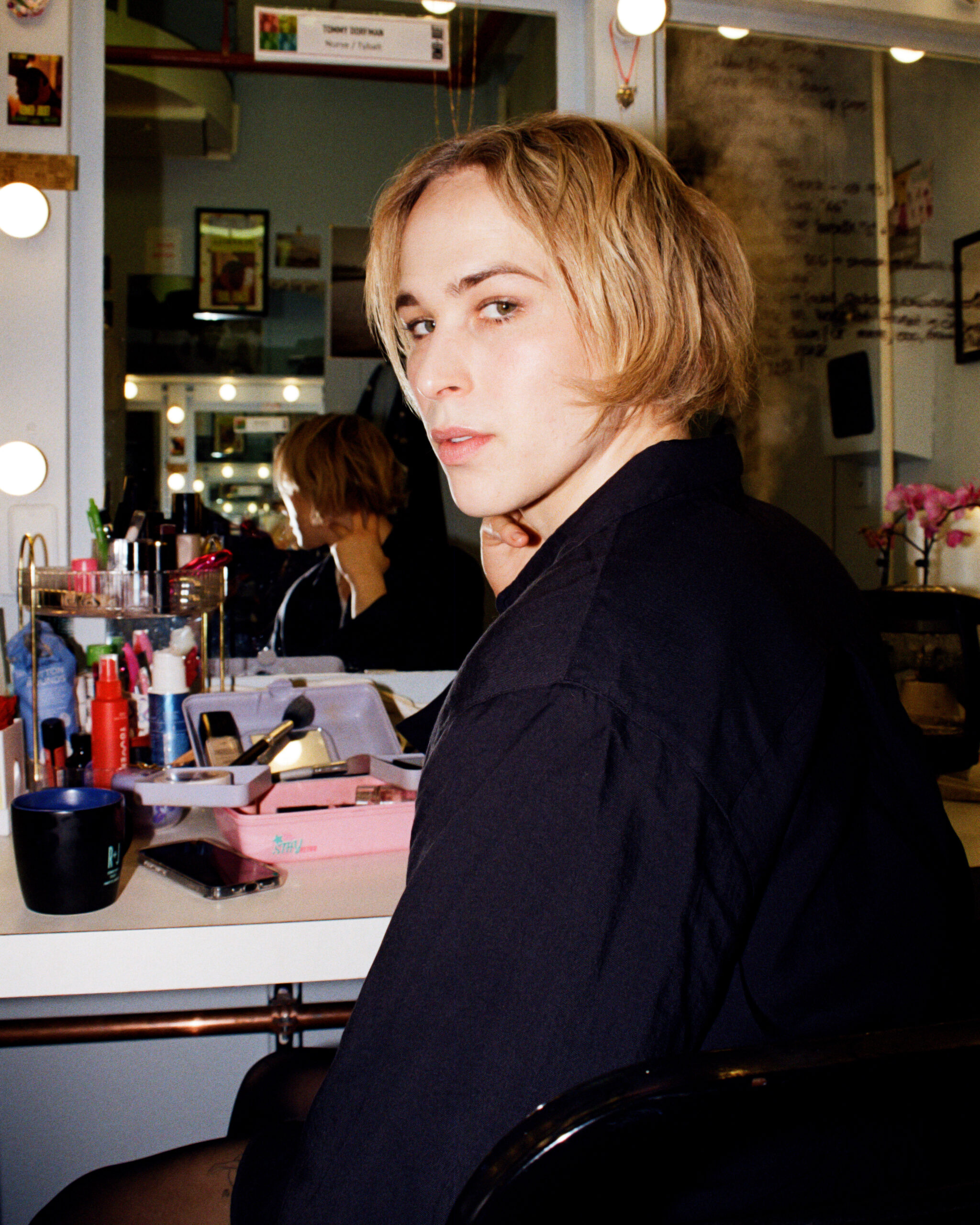
RANKIN: Yeah. And I think Sam encourages it, where you’re in conversation with the text, like your soul, your morality, your politics. I mean, I certainly felt that inside.
DORFMAN: I feel that in classics, and it’s why I love Shakespeare so much. And I’ve never had a director trust me in the way that Sam trusts me, or affirm parts of myself that I thought I had to hide. The process is incredibly vulnerable. Even just being in my body as it is, as a trans woman on stage in front of 900 people eight times a week, is just incredible. When I was first auditioning for the play, the Nurse wasn’t what I was auditioning for because it felt so abstract to me, like the least possible role to play. If anyone asked me what I would be doing at the top of this year, this would’ve been the last fucking thing I could have ever come up with. And that’s almost how I know it’s right, in its own divine way. It’s like, she’s here to teach me how to be a mother. She’s here to teach me how to fight for love even when it could cost lives. Then the flip side of that is Tybalt is an incredible amount of violence towards me as the person that I am, so I know it can be triggering in ways that feel really aligned with what my own personal experience has been as a trans person who grew up in the South, with white men in particular beating the shit out of me. So that happens in the play too, and it’s really interesting. This play is like OG opposition.
RANKIN: Oh, yeah. Full dichotomy.
DORFMAN: Exactly. It’s like a comedy/tragedy. Black/white.
RANKIN: And there’s this fluid thing happening where you’re like, “How do these people both live inside of both of these people.”
DORFMAN: I remember as I was thinking about the second part of this play, the tragedy part coming up, I die as Tybalt. I come back and I’m laid as Tybalt where I died, and then I pop up as the Nurse and tell Juliet that Tybalt died. And it feels like the Nurse sort of pays homage to Tybalt throughout the rest of the play, takes on some of that ferociousness and refocuses it.
RANKIN: Yeah. There’s such power in forgiveness. Forgiveness is our most powerful weapon.
DORFMAN: Completely. I just feel really grateful for this job. It doesn’t even feel like a job at all, which is why it’s so special. And I took a really long break from acting because I was so unfulfilled with the things that I had been doing in the beginning of my career.
RANKIN: And you wrote a fucking book that’s coming out.
DORFMAN: I wrote a book, I directed a movie—I did a bunch of weird shit. When I was thinking about the cover, my publishers wanted a headshot essentially, and I was like, “I never want to see my face on a book cover like that.”
RANKIN: Yeah. “Please don’t take a picture of my face.”
DORFMAN: But I called Ryan McGinley and I was like, “I’m so moved by your work. I would really love to do you, me, bare bones, no hair, no makeup, no nothing, just go to the woods. Are you down?” So we shot it on my friend’s farm in Connecticut, and he started blowing up the 20-foot by 20-foot fucking stoned fall mat, like a big balloon thing that you use in movies. And I climbed up this rickety ladder to 20 feet up on a barn roof. I was like, “I’m going to piss myself.” But it was good to break through that, and I jumped. I think I did the jump 30 times, and I got less scared the faster we went. And I felt this profound surrender in that process, which I would also liken to being an actor on the stage.
RANKIN: I was just about to ask, do you feel that way on stage? And how do you feel about getting ready to go on stage and then being on stage?
DORFMAN: My process is, I spend a lot of time meditating and I do really long warmups, because my body is achy as fuck. The first few weeks of previews, I was incredibly nervous, and opening night I was really nervous. But since then, I’ve been less and less nervous. And I really do pray throughout the play. I have brief moments of respite throughout, onstage and off. I think it’s interesting to spend so much time on stage. We have this really long pre-show, which I think you guys had a version of, where you weren’t necessarily participating in it but the ensemble was, right?
RANKIN: Sam loves the pre-show.
DORFMAN: Loves the pre-show. Everyday is different. Sometimes I feel really open to making eye contact with the audience and engaging with them, but then there are other days where I’m terrified, for whatever reason, and I need to just lay down on the blow-up inflatable plastic couch and stare into the lights until I go blind.
RANKIN: Yeah. The lights are kind of great for that, though. Isabella [Byrd] did your lights, right?
DORFMAN: Yeah, she’s amazing. The third character for me is the lights. It’s god. Especially because the Nurse is so pious. I’m a spiritual person, but she’s really a Christian. She loves the Bible. I love god, but in a very different way. But I find that I’ve found a lot of inspiration like using the lights as god, where she doesn’t know what to say, especially in part two.
RANKIN: Yeah, she’s asking for guidance. I want to hear about your rituals. What’s your day like, and what do you do at the theater?
DORFMAN: I mean, I wake up and I walk my dog, no phone. I smoke a cigarette and I drink a cold brew. Then I come home, make myself breakfast and make my bed. I take a long time doing things. I am very lethargic in the morning and I don’t like to rush, so I’ll wake up usually on the earlier side and really just slowly move my bones, this fucking sack of bones…
RANKIN: We also used to do the same hot yoga place and I like low-key fangirled over you from a distance. I was like, “Oh my god, it’s Tommy Dorfman.”
DORFMAN: I would’ve died if you had said something to me.
RANKIN: But anyway, you move your bones.
DORFMAN: I move my sack of bones a little bit, and then I get to the theater two hours early. I have another coffee, but I do an iced dirty chai with milk.
RANKIN: The best.
DORFMAN: And then I do a 10-minute meditation. I use the CHANI app, so I just do whatever the daily meditation is. I pull tarot for the show.
RANKIN: Your book’s a lot about that, right?
DORFMAN: It’s organized through tarot, yeah. So I pull a card for the show, and I read about it if I don’t know enough about it. I share it with Rachel and Gabby [Beans]. Usually, I text them the card. Gabby looks at it after the show, Rachel looks at it before. And I do a very long physical and vocal warmup, then I just go on stage.
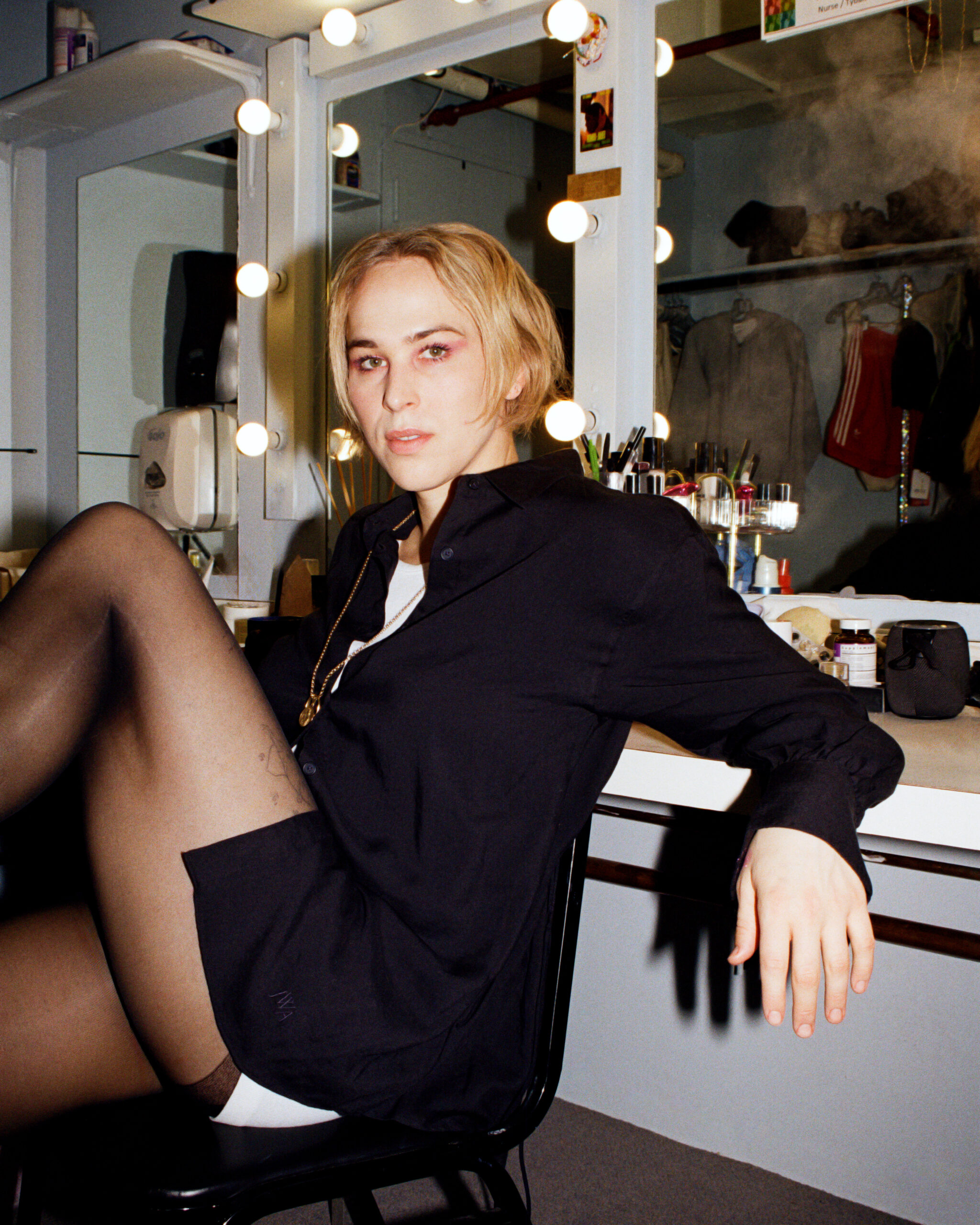
RANKIN: Great.
DORFMAN: And I have a friend who comes, and maybe I’ll go to dinner with them, but otherwise I come home and I eat a whatever meal.
RANKIN: The eating thing is tough.
DORFMAN: Then I go to bed. And that’s it, that’s the ritual. I’ve been sober for a really long time, so my only vice is cigarettes, and I smoke those when I want to.
RANKIN: I fucking love cigarettes.
DORFMAN: I fucking love cigarettes. And Gigi [Buffington], our vocal coach, was like, “Please eat whatever you would normally.” But then Sam Gold looked at me, because he knew that I smoked, and he was like, “You’re not allowed to quit smoking during my show.”
RANKIN: Oh, he does that as a rule, yeah.
DORFMAN: Like, “Nobody is allowed to quit their vices while we’re doing a show.”
RANKIN: Yeah, because then you’re just a cunt.
DORFMAN: Then you’re in some cuckoo-banana withdrawal. But I weaned myself off of the vape. I was vaping and smoking during rehearsal, and then after I was like, “Vape is not allowed in the theater. No more vape.”
RANKIN: Yeah, because if you’re vaping, you’re going to want to vape on stage.
DORFMAN: I had it in all of my water bottle pockets, on every side of the stage. I had vapes everywhere.
RANKIN: Yeah, Lost Mary.
DORFMAN: Lost Mary, clear Miami Mint.
RANKIN: I kind of need the Nurse to have a Lost Mary, low-key.
DORFMAN: I thought about pitching a vape instead of a fan. “Peter, my fan,” and I grab the vape from him. But the fan was really nice to have. If you’re looking to be an actor and you’re reading this, get your hands on a really good prop. When all else fails, you’ve got that.
RANKIN: You’re lucky though, because Sam wouldn’t let me have props. I remember we did Threepenny Opera at Juilliard and I was like, “Hey, I really think my character would do cocaine.” And he was like, “No.”
DORFMAN: “No, honey. No.” I mean, Sam is a really gifted director and a really gifted editor, so I love when we’ll have an idea and he’ll just absolutely tear it down.
RANKIN: Right. Well, I also find him to be an eternal pragmatist. He’s like, “I’m not putting something on stage that I don’t believe in.” Can I ask you one more question?
DORFMAN: Yeah.
RANKIN: I’m all about what you want to do next. And not to be like, “What do you want to do next? What are you working on next?” But what do you want to do?
DORFMAN: I would really like to do another play. I’m directing another movie next year, but before I do that I’m somehow convinced that I could go do another play of some sort. I remember I told my agents, “I’m ready to go back to acting,” but I really wanted to work the stage, just because I really like the permanence of theater. It’s immediately history.
RANKIN: Totally.
DORFMAN: It’s like, immediately memories. You’re in the present when you’re doing it, and then it’s gone. I think a lot about the permanence of my body and where it is today, and I think there’s something really liberating about being on stage and knowing that it’s only for this moment, for this many people, and I get to explore these things. And also, I’m a ritualistic person, so the schedule suits me. But I would go do a movie or TV if it was the right thing. I made a rule with myself that I’m not going to do something I don’t really believe in even if that means I don’t act for five years, which is what happened. I did little things here and there for insurance and money, but for the most part, I was not auditioning. [I was] really focused on other shit and writing a book. But with acting, I don’t want to be on a set where I don’t feel safe. I don’t want to be in any kind of creative process that I’m not 100% committed to, because it’s not worth it. I’ll go back to working retail if it comes down to it. It’s too vulnerable, theater especially. But I would really love to continue exploring characters and different kinds of women on stage.
RANKIN: You’re inspiring.
DORFMAN: Come back to the city.
RANKIN: I’m coming back. I want to come see the show again because I’m excited to see how it’s playing now.
DORFMAN: You are someone I would be honored to eat with after.
RANKIN: Let’s do that.

